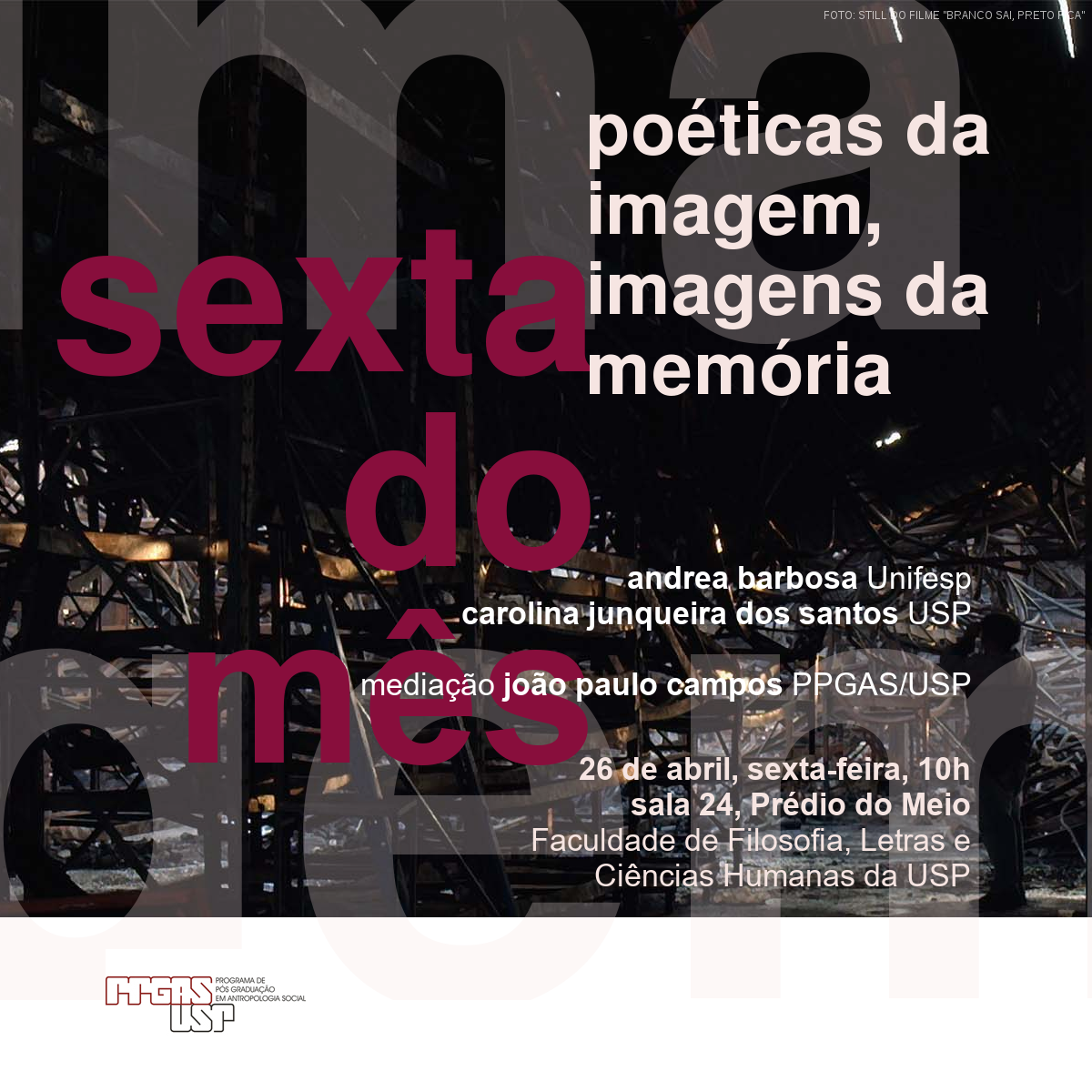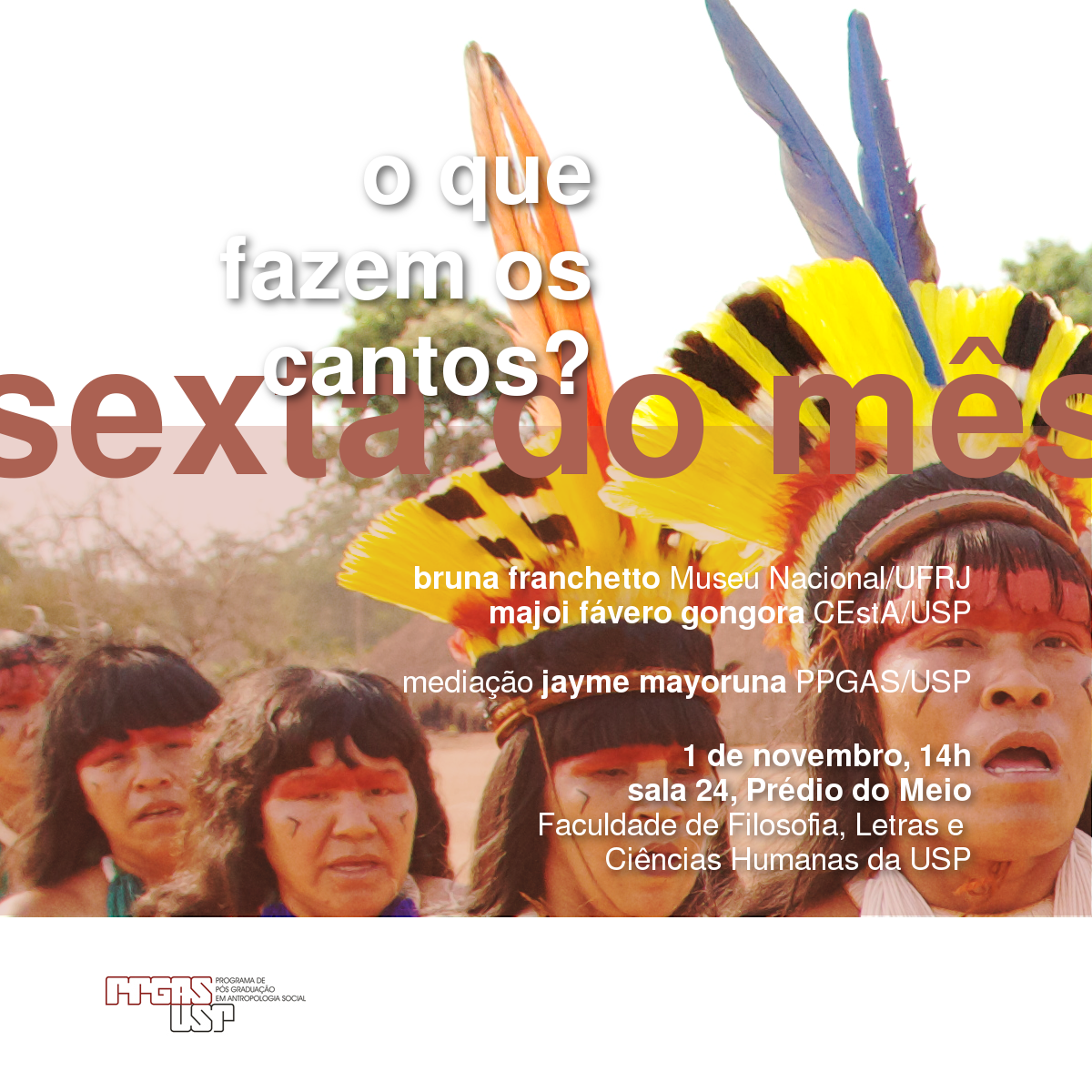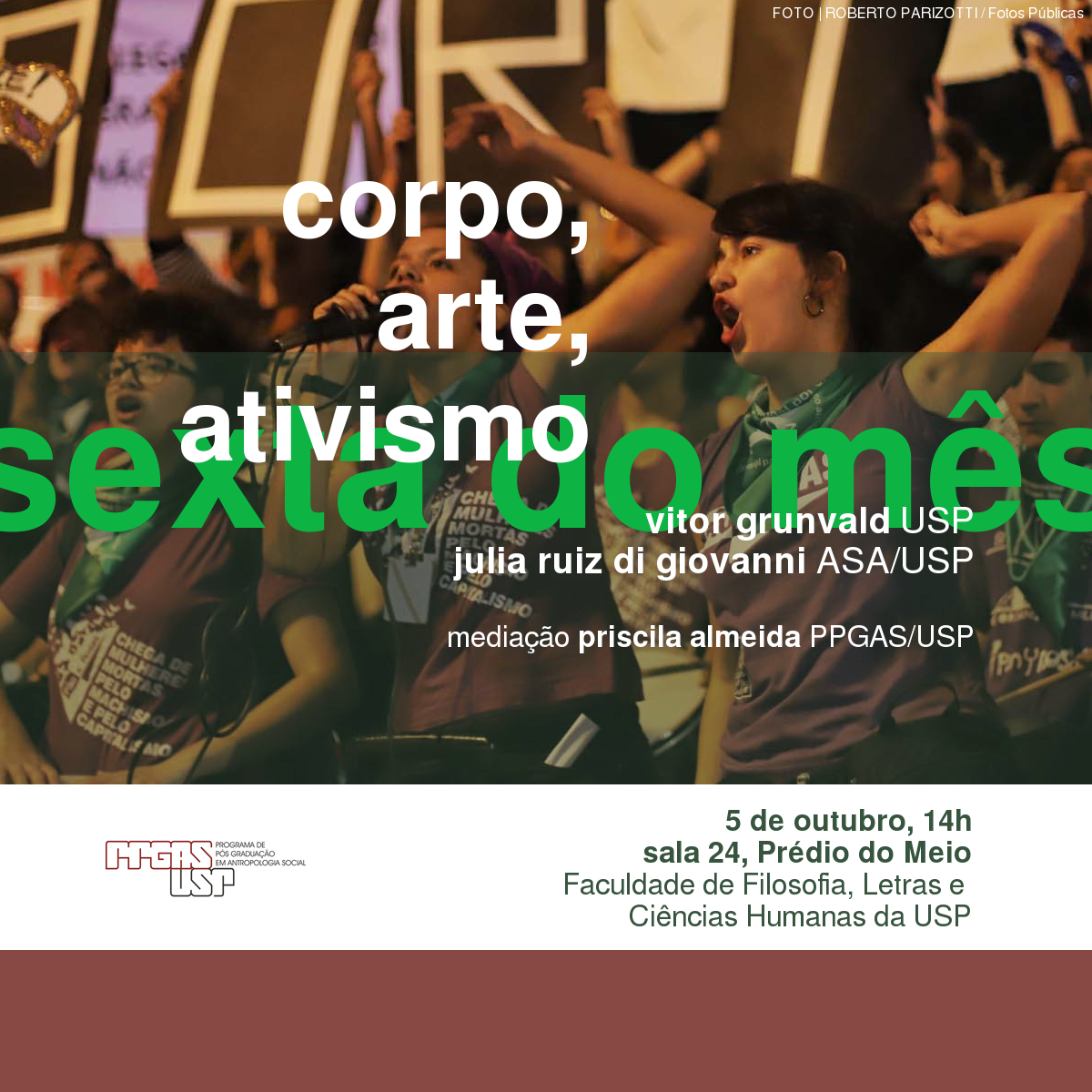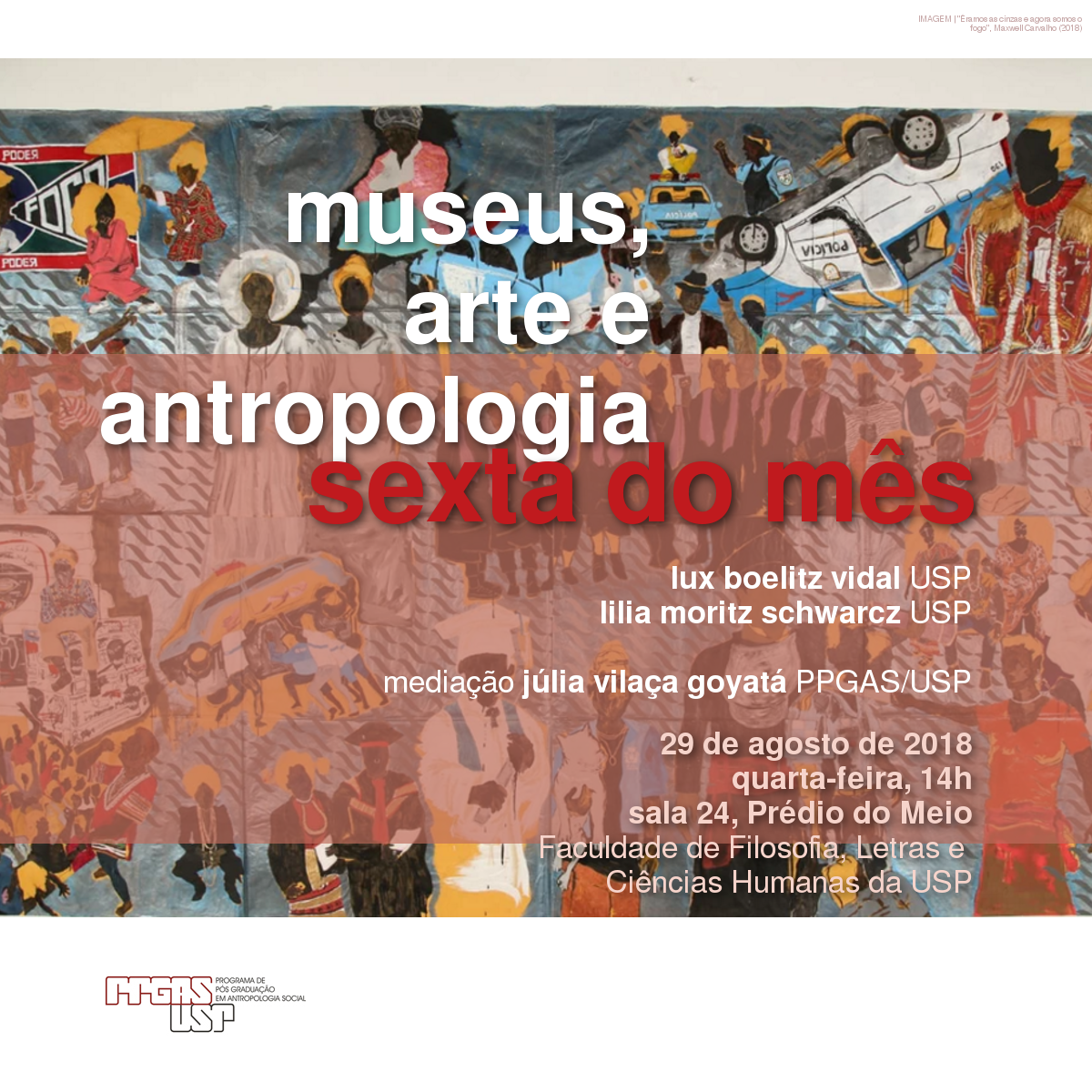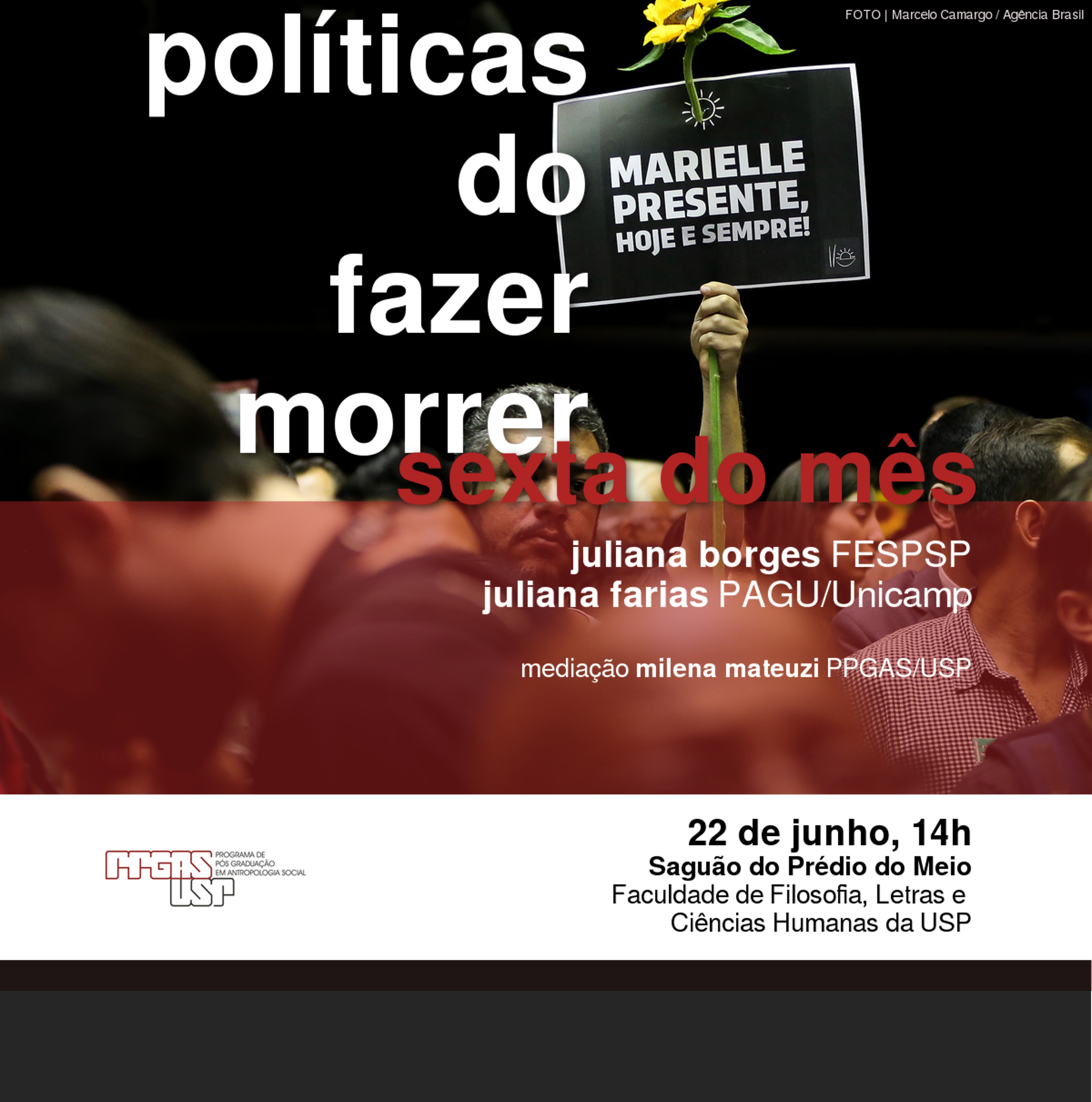Events
with Andrea Barbosa (Unifesp) and Carolina Junqueira dos Santos (USP)
Mediation: João Campos (PPGAS / USP)
The image, as an object of anthropological thought, has long fueled reflections on its production, its status and its role in the production of knowledge in Human Sciences. Furthermore, it has provided a basis for theoretical and methodological debates, whether from other theories of image, or from the encounter between anthropological making and the production of films, photographs, paintings, drawings. In this * Friday of the Month *, we want to invite everyone to a debate on the power of images as ways of thinking the direction of our history, but also of translating other modes of existence from the imagery experience. It is, above all, the possibility of reconstructing peripheral narratives and creating images of the social that are sometimes erased from our memory. It is also a matter of discussing the political-epistemological implications of the use of images in and for anthropological production, collaboratively or not. Finally, it is also a matter of thinking through images, what they bring up, like threads of memory, what they transform with their circulation, of what they do.
With Bruna Franchetto (National Museum / UFRJ) and Majoi Gongora (CEstA / USP)
Mediation: Jaime Mayoruna (PPGAS / USP)
Marching through the streets of big cities, dancing at indigenous village parties or weeping sorrows in a country bar: the word in its sung expression makes the voice a vehicle for communication between worlds. Thinking about the power of transformation and creation of songs in different contexts, the Sixth of the Month invites us to reflect on different aspects of the sung word, its role in the production of people and collectives, its ability to connect visible and invisible spaces and its forms of transmission over time. Interface between music and verbal art, sound and meaning, the songs gain attention from Anthropology through a number of questions: What do the songs of an Amerindian shaman and an immigrant musician do? Who is sung and how are the words and melodies composed by singers composed? How do you learn to sing and how do repertoires circulate between different people and generations? How are chants able to cross and connect spaces and times, transformed or not by the use of registration and diffusion technologies? What is the role of Anthropology to highlight the ways in which different collectives give meaning to verbal arts, musical practices and singing?
With Vitor Grunvald (USP) and Julia Ruiz (ASA / USP)
Mediation: Priscila Almeida (PPGAS / USP)
Body, party, dance, voice, color, transformation. These could be keywords to describe the countless popular demonstrations that have taken over the streets in Brazil and in the world, especially in the last decade, and that make attention to the overlap between political action and expressive forms inescapable. Be in the powerful and colorful manifestations of LGBTI pride in big cities or marches against political figures and big corporations around the world, what these events show us is that there is no insurgency without gesture, without sound, without imagery.
Expressions like "my body is political" and "the boon is also a struggle" intensify connections between different signs and their capacity to produce new worlds, new ways of being in the world. Disputes over taxonomies and the meanings attributed to dissident, non-conforming or unwanted bodies go through capture processes that range from the reduction of the concept of gender to an ideology and even speeches by presidential candidates. Given these findings, the Friday of the Month of September - which occurs exceptionally in the first week of October - invites to think and discuss motivations, desires, as well as the potentialities and political effects of the arts and corporealities in popular upheavals, political acts, upheavals.
How are the relations between gender, art, ethnicity and sexuality expressed and experienced in these events or in everyday micropolitical experiences? How to think about the agentivity of expressive forms in the construction of bodies and collectives? How do they act in the construction of another policy? How can anthropology strengthen the debate about the transposition of boundaries between what is art and what is political action?
With Lux Boelitz Vidal (USP) and Lilia Moritz Schwarcz (USP)
Mediation: Júlia Vilaça Goyatá (PPGAS / USP)
"Where are the blacks?" asks the flag, extended at the front of one of the most important Brazilian museums, the São Paulo Museum of Art (MASP). Intervention by the 3 de Fevereiro Front, the work is an icon of an expographic project, curated by anthropologists, which reflects on the flows of people between Africa, America, the Caribbean and Europe marked by Slavery. MASP is no exception: numerous museological institutions around the globe have been engaged in rethinking their practices, atoning for colonial violations through the repatriation of indigenous objects or the construction of collaborative curatorial projects. In addition, there is a recent movement of appropriation of these institutions by indigenous and traditional peoples, who have been increasingly interested in the construction of their own museums, appropriating them as locus of political action. Reflecting on the different roles assumed by anthropologists in these processes, the Friday of August invites us to think: what is the place of indigenous or traditional arts, their exhibition and commercialization? How has Anthropology historically connected itself to different museological enterprises and how has it innovated in this field? What theoretical advances have these engagements fostered in anthropological reflection on expressive forms? How do the categories race and art move through these processes and relate to the decolonizing debate and struggle? What are the epistemic transformations involved in the relocation of the exhibition objects to the villages / places of “origin”?
With Juliana Borges (FESPSP) and Juliana Farias (PAGU / Unicamp)
Mediation: Milena Mateuzi (PPGAS / USP)
In recent months, the use of state strength has been present in the main media vehicles in the country. Military intervention in Rio de Janeiro, the murder of Marielle Franco following complaints against police violence in Irajá (RJ), as well as the use of violence as a common way of resolving conflicts in the countryside, added up to the long history of violence and murders through which dominant groups exercise their power. According to the philosopher Achille Mbembe, the right to decide about life and death make up the fundamental attributes of sovereignty, which through the political use of death (necropolitics) seeks to subdue and immobilize specific people and social groups. In addition to these deaths by direct use of force, there are invisible and everyday deaths, due to the reproduction of conditions of misery and social exclusion, which impels us to think about issues related to the visibility and recognition of death itself as a product of the socially oriented violence of the necropolitics. Anthropology, by devoting its attention and listening to groups that historically were instituted as preferential targets for the exercise of necropolitics, is inserted in the field of disputes around the representations and visibilities to which this debate is directed. With attention to the urgency of the issue, the Friday of the Month launches the discussion on the concept of necropolitics: What is your relationship with the concepts of biopower, feminicide, ethnocide and genocide of blacks and indigenous people? To what extent is death faced or silenced in our ethnographic and writing experiences? What place do anthropological works occupy in a field of disputes around the representation of violence and death?


